When Georgetown University students set out for spring break March 6, the coronavirus threat seemed distant, but looming. COVID-19, the respiratory disease caused by the novel coronavirus, claimed its first life in the United States less than a week before. As the virus raged across Europe and Asia, the university suspended international trips, but U.S. cases remained low and campus remained open.
However, as students sought relaxation at crowded beach resorts and family outings, anxiety mounted. What was once an international concern quickly became a domestic one. The virus continued to spread and death tolls climbed. One day after spring break began, Washington, D.C., confirmed its first case of COVID-19. On March 11, the World Health Organization declared the outbreak a pandemic, certifying the severity of the crisis.
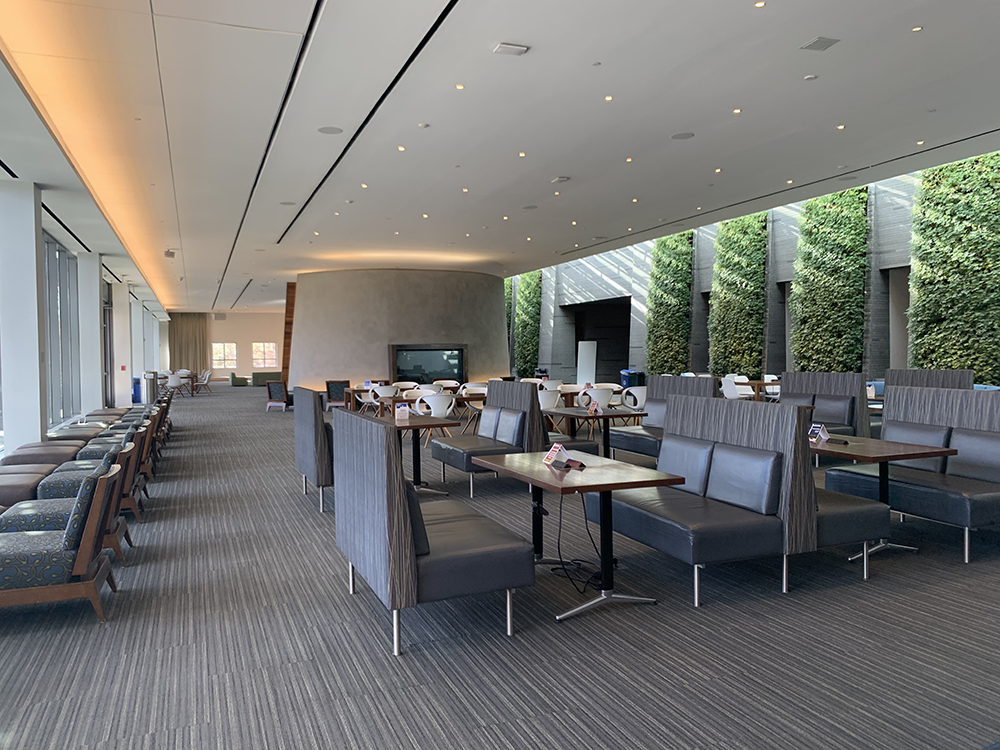
Universities across the United States took drastic measures to contain the outbreak, shifting classes online and telling students to move out of residence halls. Georgetown followed suit March 13. During the past month, the university has canceled all study abroad programs, postponed commencement ceremonies and pushed classes online for the remainder of the semester.
The crisis that has upended life across the globe has derailed life at Georgetown. The Hoya interviewed students from some of the most affected campus communities by phone, video and text to get a sense of how the pandemic and the university’s responses are impacting their lives.
First-Generation, Low-Income Students
After Georgetown shut down its campus, Sarah Craig (SFS ’22) returned to her hometown of Detroit, where she had to undertake duties many of her peers do not have to perform.
Michigan closed its K-12 schools until the end of the school year in an effort to slow the spread of the coronavirus. With her parents working full time in hospitals, Craig now has to help home-school her younger brother as she keeps up with assignments and virtual class sessions, she said.
“I know a lot of first-generation, low-income students are facing similar challenges with financial issues and having to support younger siblings,” Craig said in a phone interview with The Hoya. “That’s still something I’m navigating — the emotional challenges of this, of now having these extra responsibilities.”
Onrei Josh Ladao (COL ’21), a San Diego native, has also had to manage new responsibilities after returning home.
“Just by the virtue of being back in San Diego with my family, I can’t be a student in the same way anymore,” Ladao wrote in a message to The Hoya. “I’m helping my family where I can, meaning I have to juggle those responsibilities while also being a student.”
There isn’t the time to create support for those students, and so we just kind of get left behind. – Sarah Craig (SFS’22)
Craig and Ladao are both first-generation college students from low-income backgrounds. Uprooted from a university setting, they will have to navigate a distinct set of obstacles to reconstruct their college lives at home.
One of the biggest challenges is continuing academic life in an unfavorable learning environment, according to Craig.
“I think it’s still just the uncertainty of returning to my house that is not suited for academics of this level,” Craig said. “Because my parents didn’t go to college, they don’t really understand just the degree of school that I’m doing. They don’t really have an understanding of what it means to be in school full time like this.”
Besides having to adjust to time differences, Ladao has encountered similar barriers to effective learning.
“Making your home the new classroom is not an easy task,” Ladao wrote. “My family’s apartment is not conducive as a learning environment, and I have to make adjustments to the space around me in order to make it so.”
On March 17, Georgetown moved up the mandatory move-out date for students living in university-owned housing, ordering campus residents to retrieve their belongings before March 22. Previously, students had until March 29 to move out of their dorms.
The anxiety of having to return home at a moment’s notice was compounded by countless financial considerations.
“So many questions had clouded my mind,” Ladao wrote. “How was I going to pay for storage? Do I need to drop even more money to book a flight back to D.C.? Is it even safe for me to go back to D.C., considering the circumstances? There was no sense of stability whatsoever, and it wasn’t easy to make decisions because everything continued to change.”
Low-income families must handle an extra financial burden when their kids return home from college, since their day-to-day expenses are largely covered by the university, Craig said.
“For students who are either paying very little for school or they’re fully covered in terms of expenses and tuition, that’s one less person in a household that their family has to feed and take care of and provide for,” Craig said. “Now the student is returning to live with them and that’s one extra person the family has to provide for.”
Nationwide, a growing number of young adults raised in low-income households are attending college, according to a 2019 Pew Research Center study. Just under 40% of Georgetown students receive some amount of need-based financial aid, with the average grant covering $45,585 in fees, according to U.S. News.
As families gather resources to support returning students, students themselves have lost essential benefits offered by a college campus, Ladao wrote.
“Georgetown may have been their source for mental health resources because it’s not available to them at home,” Ladao wrote. “Furthermore, especially as we are transitioning to virtual instruction, access to the internet—a necessity for the classroom—may be out of reach.”
Support from the university has been present but lagging, Ladao added. The initial March 11 email from the university announcing the transition to distance learning did not include specific resources for first-generation, low income students.
“From the student perspective, I feel that FGLI students, throughout the transition, have been treated as an afterthought,” Ladao wrote. “While some of these issues have finally been addressed in follow-up emails, the university ought to take this experience as a lesson for being more conscious and aware of low-income students at the very beginning. The emotional, physical and financial distress that tone-deaf university communications have caused is irreparable.”
Many elite universities were not designed to prioritize the needs of first-generation, low-income students, Craig said.
“Institutions like Georgetown are not inherently created to support first-gen, low-income students and students of color,” Craig said. “Those efforts that do support those students take time to create and create integral change, but when you have a crisis like the pandemic, there isn’t time to create integral change because the university has to change things so often. There isn’t the time to create support for those students, and so we just kinda get left behind.”
The university has tried to take some steps to ease the financial burden of the transition. Georgetown teamed up with private storage providers to offer students discounts on storage, according to a March 15 email from Senior Vice President and Chief Operating Officer Geoff Chatas. Two days later, Provost Robert Groves announced by email that the university would be covering the wages of student workers for the rest of the semester.
Amid the turmoil, students have played a significant role in supporting one another. Craig’s friend offered to store her belongings at her home for free. Ladao has collaborated with other student activists to lobby the university for increased financial and academic accommodations for less privileged members of the community. Students have also compiled and circulated a 12-tab spreadsheet with lists of food, funding and other resources.
Ladao said the willingness of students to support one another has persisted, despite the uncertainty of the situation.
“It’s been wonderful to see students checking up on one another and ensuring that we’re all in this together,” Ladao said. “Nothing has been too big or too small to contribute to this grand effort to help one another.”
Seniors
The university’s decision to go digital seemed surreal at first, Samira Mehta (SFS ’20) said.
“At the beginning, I think we were all a little stunned when the news came out. We were like, ‘This doesn’t seem necessary,’” Mehta said in a phone interview with The Hoya.
As the severity of the crisis became apparent, Mehta and many of her senior classmates were confronted with a difficult reality. The pandemic would take away the quintessential conclusion of their college careers, Mehta said.
“It was devastating to say goodbye to friends prematurely, to have to forgo senior spring and all of the events that that holds and to not quite get the closure to a major chapter in my life,” Mehta said.
As the pandemic worsened in mid-March, U.S. health officials warned against hosting large gatherings. Many U.S. universities took further precautions by postponing or canceling their graduation ceremonies.
Every May, graduating seniors gather with classmates, faculty and family at commencement to commemorate the achievements of the Georgetown senior class. For many, the ceremony is a momentous culmination of the college experience, Mehta said.
“A lot of times commencement and the last couple of months give you that chance to reflect and really move through all that you’ve experienced here,” Mehta said. “Each day you move a little bit forward, and you don’t really feel yourself doing it. Even studying abroad, taking a class outside of your major — you just learn so much.”
Over 1,000 students, parents and faculty signed a March 17 open letter to the university, encouraging the administration to postpone commencement instead of canceling it.
On March 18, the university announced that it would postpone commencement activities to a time when community members could safely convene.
We’re all just a little devastated, but glad we have each other. – Samira Mehta (SFS’20)
Katrina Schmidt (SFS ’20), one of the letter’s original authors, said the lack of closure is one of the most painful consequences of the postponement. (Full disclosure: Schmidt formerly served as senior news editor for The Hoya).
“I think in a university setting, it is really valuable, you know, when a lot of people are doing a lot of different things, where you can have those moments when you can all come together and recognize the shared experience that you had, and honor it and commemorate it,” Schmidt said in a video interview from her home in Baltimore. “I can lose senior ball, and I can lose the Tropaia ceremony. It doesn’t have to be Obama speaking at commencement, but I think there is a lot of value in, I think, properly honoring an experience.”
However disappointing the reality, Mehta recognized the necessity of the decision.
“We understand that this is the right move by the university and it’s necessary,” Mehta said. “It was really, really comforting to see that they understand how much this means to us.”
The stress and unease of unsaid goodbyes are compounded by uncertainty in the world outside the campus gates, Mehta added. Graduating seniors are poised to enter an economy experiencing a recession, according to the International Monetary Fund.
“A lot of students are worried about what next year is even going to look like. I think no one even knows when this is going to end because it is so unprecedented that it’s just a state of confusion and uncertainty,” Mehta said.
Nevertheless, Georgetown seniors have found solace in solidarity, and many seniors are making up for graduation with less ceremonial moments of reflection. Mehta and Schmidt have managed to keep in touch with their classmates online.
Despite the challenges of losing senior spring, Mehta considers herself lucky.
“Just knowing that we’re healthy and we have families to go back to I think is something that we’re really, really grateful for,” Mehta said. “We’re all just a little devastated, but glad we have each other.”
Study Abroad
The COVID-19 outbreak undid Nicole Ruggiero’s (SFS ’21) semester weeks before it upended life at Georgetown. Ruggiero, who is minoring in Italian, was studying abroad in Bologna, Italy, and found herself in the early throes of the COVID-19 crisis when she began her coursework at the beginning of February.
Ruggiero and her peers shrugged off the early warning signs of disruption, she said.
“I remember that when we first received the email from the University of Bologna that the university would not be having in-person lectures that week, most of us were like, ‘Okay that’s a precaution. We’ll be back to normal next week,’” Ruggiero said in a phone interview with The Hoya. “In fact, my friends and I booked a day trip to a town in northern Italy for the next day.”
As the crisis worsened, however, uncertainty began to set in, Ruggiero said.
“Every 15 minutes or so there would be a public service announcement about the virus — about washing your hands, about looking out for symptoms — and everything just felt very off to me,” Ruggiero said, recalling a train trip. “Then by the time that they were saying that classes would be closed for a second week, I felt like we were just waiting to go home by that point.”
In late February, coronavirus cases in Italy surged to 400, and the death toll rose to 12, according to BBC. By the time the University of Bologna had organized an instructional continuity system online, Brown University, which ran Ruggiero’s program, had decided to pull the plug Feb. 29. Brown’s decision to cancel the program followed the Department of State’s travel warning encouraging Americans to avoid all nonessential travel to the country.
It was a frenzy. – Nicole Ruggiero (SFS’21)
Georgetown had canceled its study abroad programs at Villa Le Balze in Florence, Italy, days earlier. The university also suspended all university-related travel to South Korea on Feb. 25 and to China on Jan. 28 because of mounting COVID-19 cases and fatalities.
Ruggiero and her peers were initially angered by the cancellation, she said.
“We still thought that this was being overly cautious. We thought that it wasn’t fair. We wanted to stay in Italy. We wanted to take the risk,” Ruggiero said. “And, I mean, if we had known what was going to happen, none of us would’ve wanted to stay, but at that point, we were just absolutely livid.”
After digesting the severity of the situation, Ruggiero decided to return home. Coming home was no plain sailing process, she said.
“I mean it was just hectic to pack and say goodbye to all of our friends, to tie things up with the program,” she recalled. “It was a frenzy.”
In accordance with the policy from the Centers for Disease Control and Prevention, she self-quarantined for 14 days after her return to the United States.
“I didn’t want to risk my parents getting it considering they’re members of a vulnerable population, so I had to take a taxi back,” Ruggiero said after her quarantine had ended. “My mom had left a pair of gloves and a mask outside for me and I just had to go upstairs to my bedroom without touching herself or even saying hello to her, and I stayed in here by myself for 14 days other than to go outside and shower.”
Georgetown officially recalled all of its students studying in the Schengen Area of Europe on March 12. Four days later, Georgetown suspended all of its study abroad programs. The university promised to work with students to manage reimbursement requests and help withdrawn students enroll in new classes, according to an email sent to study abroad students by Director of Global Education Craig Rinker.
Over time, Ruggiero said she normalized the drastic shift in routine.
“It was very tough, but like I said, by the end of it, it just becomes sort of routine and you develop a sense of a new normal and I just tried to keep in my head why I was doing it,” she said. “I do think that it just is going to be the responsibility of most of us right now to realize that this is our new reality and we’re going to have to take it on to protect our vulnerable populations, and I just thought a lot about my mom and my grandparents and that kept me in there and kept me going.”
Georgetown has helped study abroad students pay for flights and housing; however, a spokesperson did not directly state if the university would offer tuition refunds.
“Georgetown is facilitating refunds to students for recoverable costs, like housing, from host programs. This is done as our partners are able to recover these costs on behalf of students,” a university spokesperson wrote in an email to The Hoya. “Georgetown also provided financial support for repatriation costs (flight change fees, etc.) for our students abroad when they had to return to their permanent addresses at short notice.”
Many Georgetown students who have been pulled from their study abroad programs have also raised concerns about meeting their graduation requirements. Ruggiero and 48 other School of Foreign Service students penned a letter to SFS Dean Joel Hellman requesting greater flexibility with the 120-credit minimum requirement. The SFS requires that juniors and seniors take a minimum of 38 3-credit courses, but this requirement was cleared for sophomores and freshmen earlier this year.
After the study abroad cancellations, the university created the GU Global Campus program, through which study abroad students can enroll in a special academic term titled Module C to fulfill their credit requirements for the semester. One hundred students have signed up for the program, which runs online from March 30 until June 12, according to a university spokesperson.
Other study abroad programs continued their classes online. Ruggiero was able to continue her studies at the University of Bologna through a customized set of courses, she says.
Ruggiero does not fault the university for its brisk response. The university, however, could have taken more steps to support students returning from abroad, she said.
“I do think that Georgetown can and should do better in reaching out,” Ruggiero said. “If they’re going to make such a sweeping and difficult decision for students, they need to be more available to us.”
International Students
After Georgetown converted to online classes, Elliot Mack (SFS ’22) did not join the mass exodus of students leaving campus. In fact, he had no choice but to stay.
“I am half-French, half-American. My parents live in Istanbul, Turkey,” Mack said in a video interview with The Hoya. “I do not have a residency permit anymore to live in Turkey because it expired one year after I left for college, so I cannot go back there since they’re not accepting tourists, especially French nationals. And even if they were, I would have to spend two weeks in quarantine in basically the middle of Turkey in these empty facilities, which obviously would impede strongly on my academic work.”
Though Mack is a U.S. citizen, he has no home base in the country, he said.
“Although I’m a U.S. citizen, I do not have a U.S. permanent residency,” Mack said. “I don’t have really any other viable options in the U.S. that are feasible and not with immunocompromised people or that are not stressful situations.”
Mack opted to stay on campus because of these complex circumstances, joining approximately 174 other undergraduate students who have not been able to return home, according to a March 30 universitywide email from Groves. After applying to stay on campus, Mack now lives with a roommate in a Village A apartment.
Mack is one of 488 international undergraduate students attending Georgetown. International students have encountered unique obstacles adjusting to pandemic college life. Some are stranded in the United States away from their families, while others struggle to adjust back home.
Ryan Kim (MSB ’22), a native of Seoul, South Korea, was also unable to return to his family.
“Since my home country, South Korea, currently has a high infection rate, my parents and I decided I should stay here,” Kim said in a phone interview with The Hoya. “I’m the only one here. All my family is in Korea. Fortunately, they are all safe and healthy.”
Students who wished to remain on campus had to fill out a form with the Office of Residential Living before March 17 to receive permission from the university to continue living in university-owned housing, according to an FAQ page on the university’s website.
Kim applied to live on campus, completing the required university survey. An anxious, class-packed week passed before his application was approved.
“It’s been a very tough and challenging experience for me,” Kim said before getting his decision. “I was relieved at the same time because school did still give me the opportunity to stay here. But at the same time, I wish they could inform me earlier so that I don’t have to wait until this Friday.”
Mack’s journey was more complicated. His initial application to stay on campus was denied. The university did not specify why, according to Mack. Mack was able to secure his on-campus housing only after numerous email follow-ups and the intervention of a faculty member. The university’s process for housing allocation was mechanical and inflexible, Mack said.
“First of all, it’s impersonal. And second of all, it’s like they know better than you when, realistically, they don’t know what your situation is,” Mack said. “It just feels like they don’t trust students to think through things and make the best decisions for themselves.”
The struggle for housing was frustrating and isolating, he added.
“I’m already alone in my apartment, and it’s weird that I have to fight to stay alone in my apartment. It doesn’t seem like an ideal situation and I don’t know why I’m fighting for a non-ideal situation, but it’s the best I got,” Mack said. “I was alone in it, and it took me so much energy — just personal will and energy — to change my situation.”
The university has considered every on-campus housing request carefully, even giving students the ability to explain their rationale for staying directly to administrators, according to a university spokesperson.
I’m sleeping when they’re awake, and I’m awake when they’re about to go to bed. That’s the worst part. – Muhammad Ahsan Shafique (SFS’22)
“Each application was thoughtfully reviewed, and all students who asked to speak on their situation confidentially were reached out to by university staff,” the university spokesperson wrote.
Despite this practice, the university’s response to housing requests and to the crisis more broadly has lacked student input, Mack said.
“I think that they’ve been doing great at talking amongst themselves and organizing, but I don’t understand why there are not students in the rooms when they’re making these decisions,” Mack said. “Nobody knows better than we do what we need right now.”
As some international students struggle to find accommodation in the United States, others are straining to recreate campus life at home.
Muhammad Ahsan Shafique (SFS ’22) lives in Pakistan. When news of the university’s decision broke, his family ordered him to return home. Because of the nine-hour time difference, he now takes his classes at night and sleeps during the day. The routine is grueling, Shafique said.
“There are so many problems with me coming here,” Shafique said in a video interview with The Hoya. “My sleep schedule is a mess. I go to bed at nine in the morning to noon, something like that, and I wake up between six and eight. So I’m basically on Eastern Time.”
Though his professors have been very supportive, Shafique has struggled to manage the shift.
“My body doesn’t let me concentrate, so I can’t do a lot of work. And, as you can imagine, I can’t socialize with my family,” he said. “I’m sleeping when they’re awake, and I’m awake when they’re about to go to bed. That’s the worst part.”
Spotty internet and a deteriorating health crisis in Pakistan is compounding the stress.
“It’s been pretty bad,” Shafique sighed.
This article was updated April 5 to clarify a student’s position on commencement postponement .








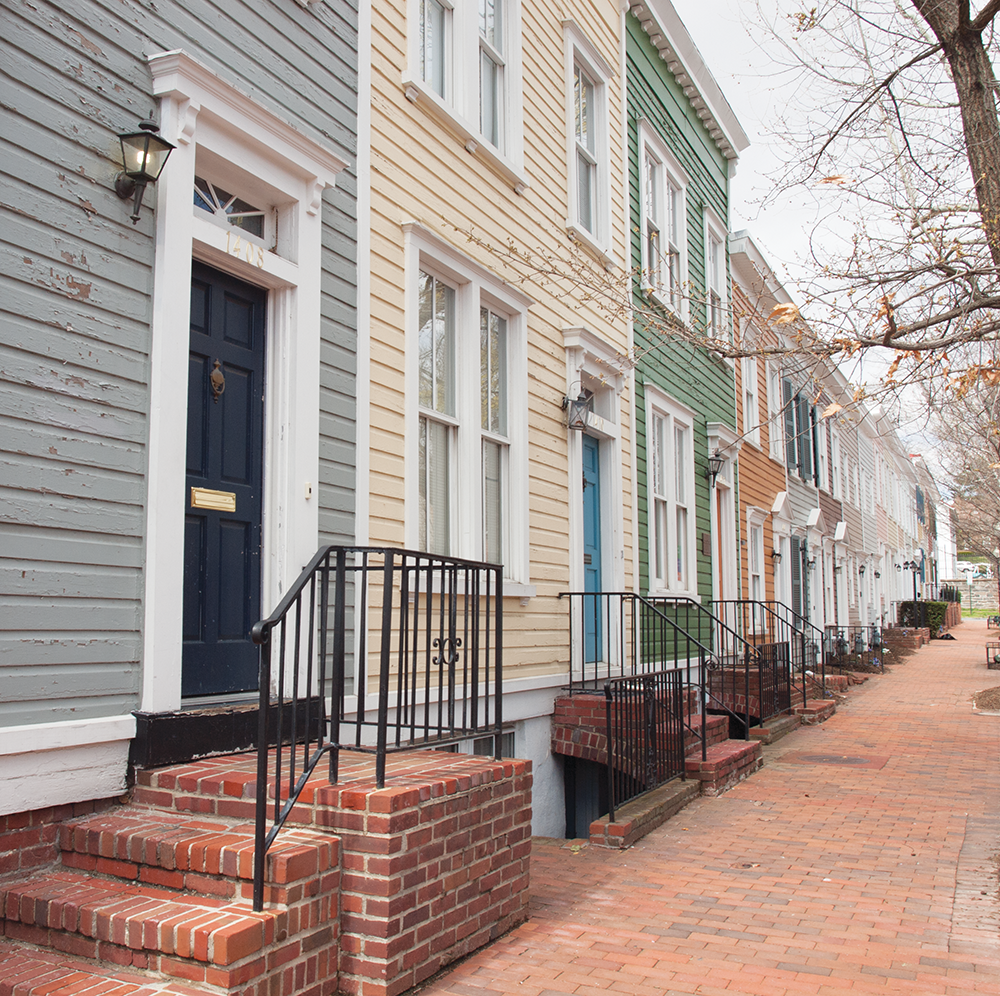
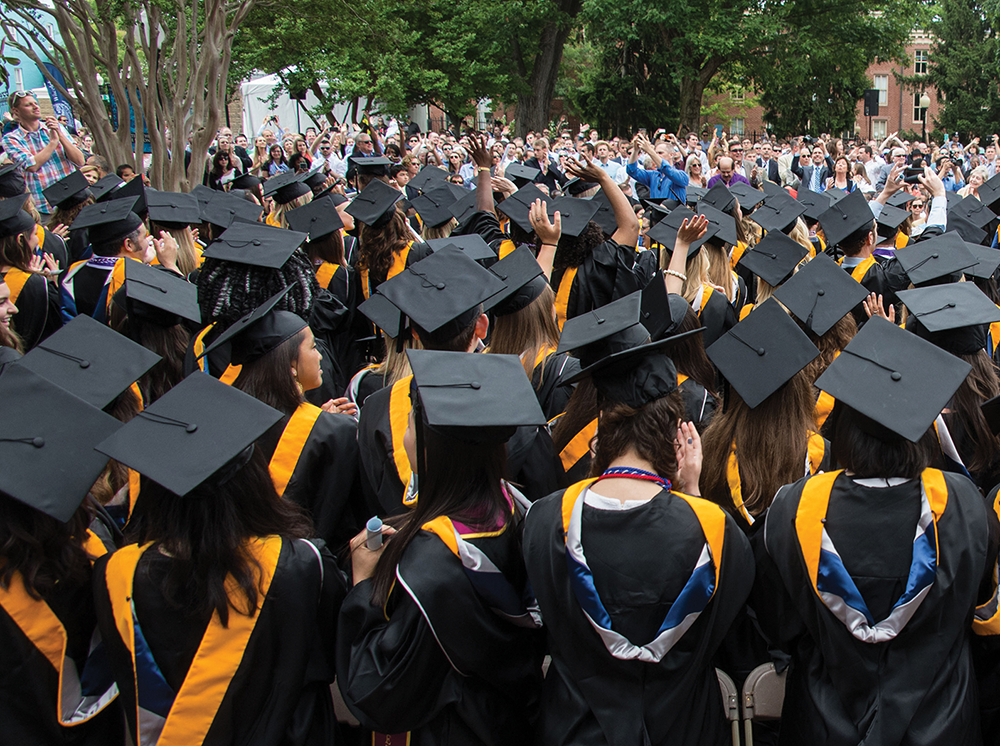
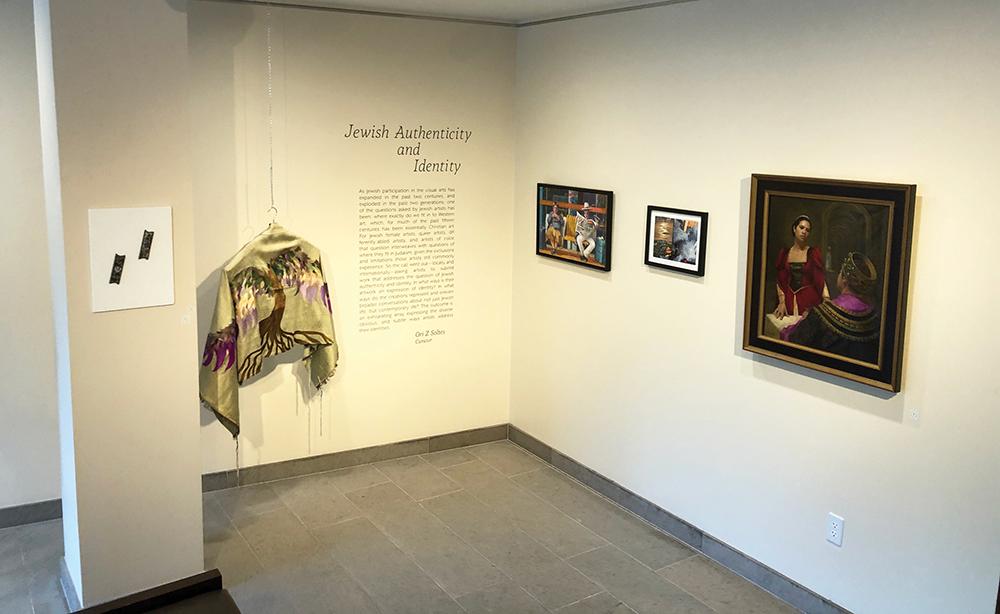
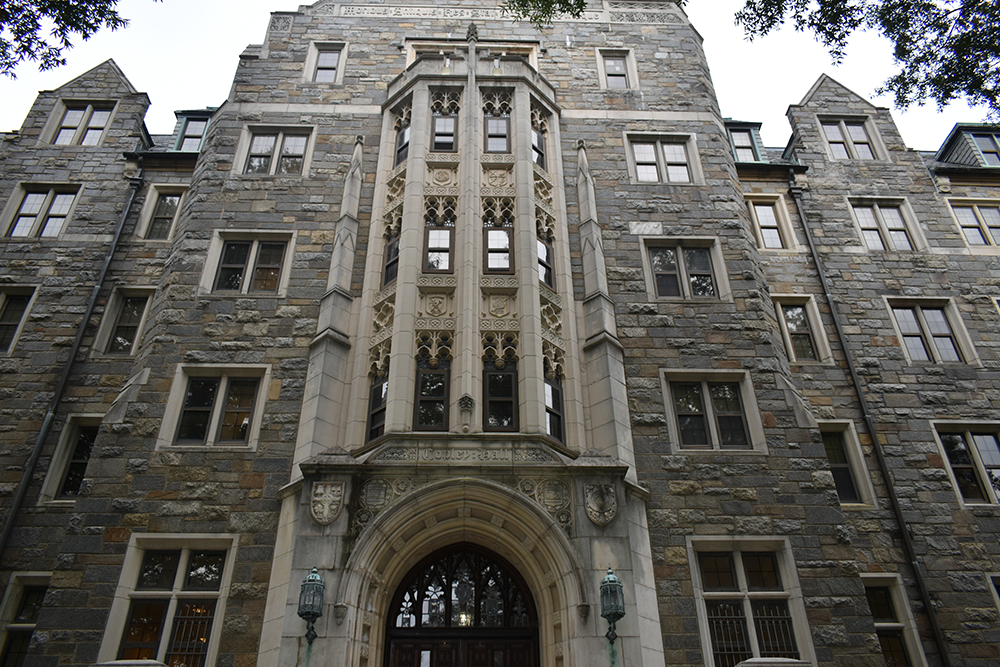
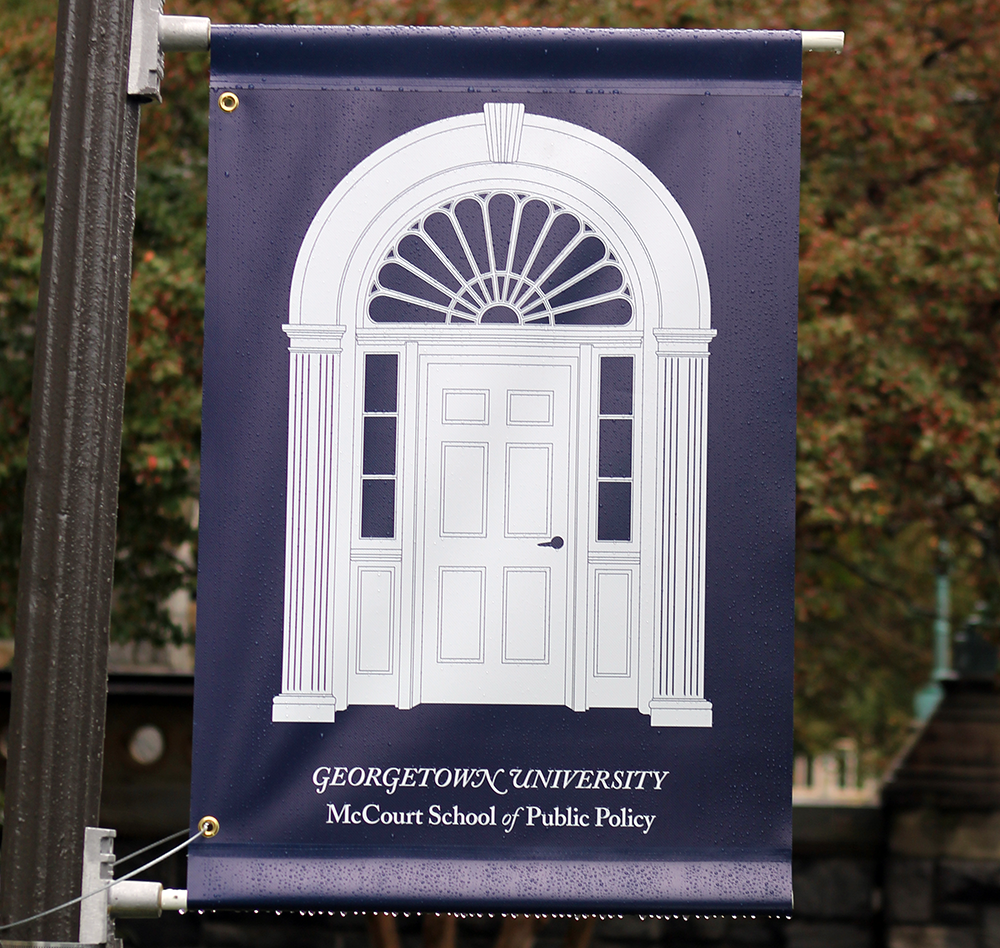








Mike Anderson • Apr 24, 2022 at 8:29 am
Calamity, Change and COVID-19 have forced Georgetown students to navigate an unprecedented disruption to their lives. This has been a challenging semester for all of us, but I am grateful
Milan Day Chart • Aug 11, 2021 at 11:35 am
Now the situations are changing is not same as we faced before. Hope we can live normal soon.
Main Ratan • May 5, 2021 at 3:01 am
I am totally agreed with you. Thanks a lot for keeping great stuff. I have bookmarked your website because this site contains valuable information in it.
Pihu Agrawal • May 1, 2021 at 1:27 am
In India, students are facing this problem from the last year. These all affecting their school and collage life to much.
G vahanvati • Mar 4, 2021 at 1:44 am
Students around the world are facing this problem with the disruption to college life. Situation for aw students is not good either
https://www.goolamvahanvati.com
Arjun Pandit • Feb 25, 2021 at 3:33 am
Now the situations are changing is not same as we faced before. Hope we can live normal soon.
Arjun • Feb 10, 2021 at 1:30 pm
Thanks for sharing this article. Situations are changing now after vaccine. Hope everything will be fine soon.
Varun Sharma • Nov 12, 2020 at 2:36 am
Thanks for the great post! Looking forward for such articles on your website.
Varun Sharma • Oct 27, 2020 at 2:17 am
Thanks for sharing the valuable information.
Subh • Oct 21, 2020 at 6:44 am
In India, the situation for students is much worse than in all other developing countries.
Jonathan • May 5, 2020 at 4:57 am
This is the same situation everywhere in world. I had something important with my assignment now all closed. Hope everything will be normal soon.
Zachary Osborne • Apr 6, 2020 at 5:19 pm
Are there any places (study spaces, classrooms, dining places) still open at school? I went back home to North Carolina for spring break and have really struggled adjusting to online classes and living back at home. I had wanted to return to campus for the rest of the semester, but I have no idea how the conditions are at school.